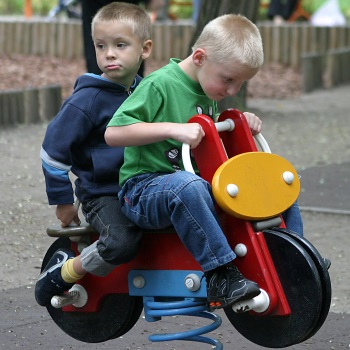 The term “preschooler†refers to young children ages 30 months to five years, when the child starts kindergarten. During this time the child experiences tremendous growth physically and socially.
The term “preschooler†refers to young children ages 30 months to five years, when the child starts kindergarten. During this time the child experiences tremendous growth physically and socially.
A child learns about the world through play. A young preschooler tends to engage in solitary play. At this stage, a child will play alone even in a group setting. In time, the child will engage in parallel play in which two or more children participate in an activity near each other but not talking to each other.
It is important for adults to provide children with lots of opportunities to play in a safe and supportive environment. Young preschoolers are only concerned with their own needs and can be selfish by taking objects even when another child is using them. Although an adult can start talking about “sharing†it will be awhile before the child understands the concept.
There are a variety of places for a young child to interact with other children the same age. Many local libraries have story time where a child can either listen or roam around in a small room. Community centers often have gym time reserved for preschoolers. Appropriate toys and equipment are available for the child to play or run around and burn off energy in a positive manner.
Arranging play dates with another care provider can allow two or three children to be together at someone’s house. Ideally, there will be lots of space for each child to move around and a few toys such as blocks, Duplo, toy trains or a doll house. Although this is an opportunity for the adults to talk and exchange ideas, the primary focus should be on the children. By keeping the visit relatively short, about 90 minutes, the visit can be successful. If the children do have issues that cannot be resolved, then it is best to leave the situation early and try again another time. Above all, it is important for the care providers to remain calm and not take the behavior of their children personally.
An outing to a playground designed for younger children can be the perfect way to connect with other preschoolers in the neighborhood. If the equipment is the appropriate size, it will give the children the chance to play safely and develop their gross muscle skills. Given the impulsive nature of children at this age, ensure the area is fenced to prevent a child bolting into traffic.
A routine trip to the local mall may seem boring to an adult, but for a preschooler it can be an adventure especially if there is no need to hurry. Taking time to literally smell the flowers and even picking a dandelion bouquet can be a joy for everyone. By talking to neighbors and sales people, the care provider is modeling appropriate social behavior which the child will soon imitate.
Younger preschoolers are extremely busy and use play to explore the world. So much to do, so little time, let’s have fun!










